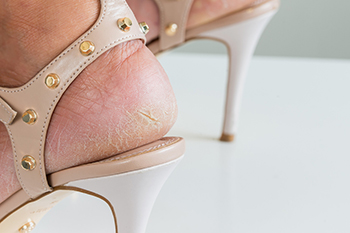
Cracked heels, a common and often painful foot ailment, may be more than a superficial concern. It could be a subtle indicator of underlying nutritional deficiencies. Essential vitamins like A, C, and E, along with minerals such as zinc, contribute significantly to skin health. Insufficient intake of these vital nutrients can compromise the skin's elasticity and integrity, leading to dryness and fissures, particularly on the heels. Vitamin A plays a vital role in skin regeneration, while vitamin C supports collagen synthesis, essential for maintaining skin suppleness. Vitamin E functions as an antioxidant, protecting skin cells from damage. Zinc aids in wound healing, essential for repairing cracks in the skin. Understanding the correlation between vitamin deficiencies and cracked heels highlights the importance of a well-balanced diet and, when necessary, nutritional supplements. If you have cracked heels, it is suggested that you confer with a podiatrist who address the problem and offer treatment options.
Cracked heels are unsightly and can cause further damage to your shoes and feet. If you have any concerns, contact Dr. Larry Cohen from New York City. Our doctor can provide the care you need to keep you pain-free and on your feet.
Cracked Heels
Cracked heels appear unappealing and can make it harder for you walk around in sandals. Aside from looking unpleasant, cracked heels can also tear stockings, socks, and wear out your shoes. There are several methods to help restore a cracked heel and prevent further damage.
How Do You Get Them?
Dry skin is the number one culprit in creating cracked heels. Many athletes, walkers, joggers, and even swimmers suffer from cracked heels. Age and skin oil production play a role to getting cracked heels as well.
Promote Healing
Over the counter medicines can help, especially for those that need instant relief or who suffer from chronic dry feet.
Wear Socks – Wearing socks with medicated creams helps lock in moisture.
Moisturizers – Applying both day and night will help alleviate dryness which causes cracking.
Pumice Stones – These exfoliate and remove dead skin, which allows for smoother moisturizer application and better absorption into the skin.
Change in Diet
Eating healthy with a well-balanced diet will give the skin a fresh and radiant look. Your body responds to the kinds of food you ingest. Omega-3 fatty acids and zinc supplements can also revitalize skin tissue.
Most importantly, seek professional help if unsure how to proceed in treating cracked heels. A podiatrist will help you with any questions or information needed.
If you have any questions, please feel free to contact our office located in Midtown, Manhattan . We offer the newest diagnostic and treatment technologies for all your foot care needs.







